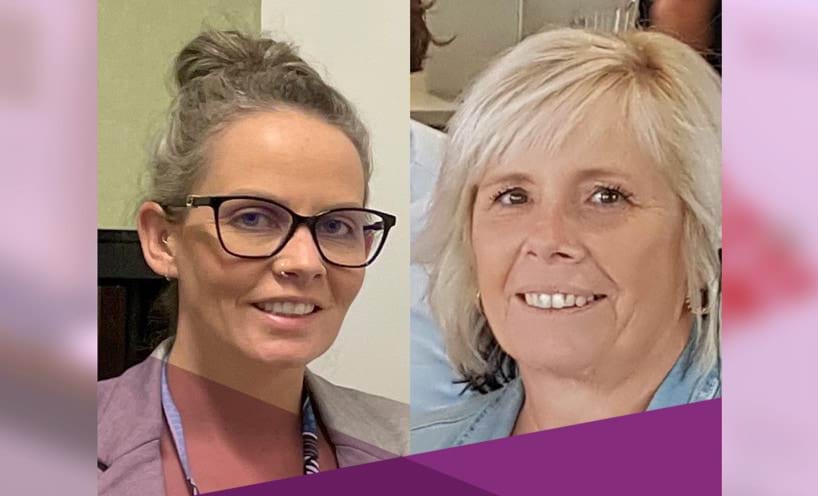- Published:
- Tuesday 27 April 2021 at 10:00 am

L–R: Ali and Maxine
Navigating the court system can be confusing and complicated. Too often people can’t find the information they need or are unable to access vital non-legal support. For people with family violence legal needs, this confusion can be even more stressful.
‘When people have a legal problem, there are often a range of life and financial problems underpinning it, or are at risk of being exacerbated by the legal issue,’ said Leanne Sinclair, Victoria Legal Aid’s Associate Director, Family Violence.
‘When family violence matters reach court it can present a critical opportunity to not only improve people’s safety, but to start to identify and address related issues in their lives.’
We're taking a human-centred approach to our service delivery to help improve the court process for people with family violence legal need.
Based on our experience and insights from our clients, we’ve introduced new roles as part of our Specialist Family Violence Courts project. Already, our new information and referral officers in Shepparton and Ballarat, Ali Bennett and Maxine Hogan, are making a profound impact on their communities.
People need non-legal support as well as legal help
‘The client journey is so important,’ said Ali, Victoria Legal Aid’s Shepparton Information and Referral Officer.
‘When we listen to clients, we can help them achieve the outcomes they want and need. I’m there to help them navigate the system whichever way they need to. To get those best outcomes, we need to ensure the person has a choice, a voice and their own autonomy.’
Ali grew up in Shepparton and has worked in the family violence sector within her community for years.
‘It’s really important to get non-legal people with community knowledge out there talking to people. Lawyers can be intimidating for a lot of people – talking to someone else can allow them to open up a lot more.’
How these Information and Referral Officer roles will be developed is also based on specific needs within that region. Where Ali has seen high demand for services designed to help perpetrators end patterns of behaviour, Maxine, our Information and Referral Officer in Ballarat, has identified a strong need in helping her community identify family violence in the first place.
‘We’re already seeing differences emerge between the regions,’ said Leanne.
‘This demonstrates that by allowing flexibility in these roles, we’re better equipped to serve people’s needs in their individual communities.’
Our new roles are designed to put people first
Rather than working from a rigid position description, our information and referral officers are encouraged to develop their role based on real-world insights from the people they help.
Some of the needs we’ve identified include:
- help understanding the court process
- help identifying that a situation is family violence
- referrals to family violence support services
- referrals to counselling for both perpetrators and affected people
- timely referrals dependent on where they are in the court process.
‘Our information and referral officers are able to do so much more than simply pointing someone in the right direction,’ said Leanne.
'We make warm referrals. That means sitting down with someone, explaining their options, and speaking to the service we’re referring them to directly. Warm referrals also prevent people from having to retell their entire story to each service they interact with.’
People need non-legal help alongside legal resources
We know that duty lawyers alone don’t always have the time or areas of expertise to provide this targeted help when people most need it. Information referral officers work alongside duty lawyers to provide this additional help to clients.
‘Duty lawyers are incredibly busy. They can’t necessarily find the time in a day to provide additional support outside of the court process,’ said Maxine.
‘But making a timely and warm referral is crucial. Often, if we’re trying to make a referral for someone after the court process has finished, it’s already too late.’
By designing services based on real-world needs, we can provide targeted and impactful solutions to not only someone’s legal problem, but related life problems too.
Holistic help where life problems and legal problems intersect
In Ballarat, Maxine plans to spend the next six months growing her already strong community connections.
‘We’ve been really well received here with community legal centres and other community stakeholders, like Orange Door.’ said Maxine. ‘They’re really on-board. I imagine it will get really busy both ways – they’re letting people know about us and we’re making warm referrals to them.’
Another benefit of the new information and referral officers is the ability to see a range of people beyond the scope of someone’s specific legal matter.
‘My goal is to eventually assist everyone experiencing family violence who has a legal problem, not just within specific silos of law,’ said Ali.
‘I hope that over time we can expand the role to help more people.’
More information
Read more about our specialist family violence courts project.
Read more about our Client-first strategy.
Get help for family violence intervention orders.
Updated

